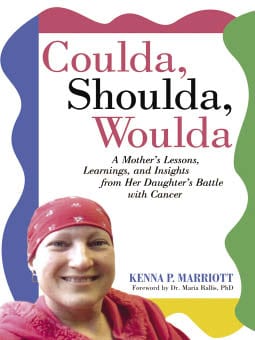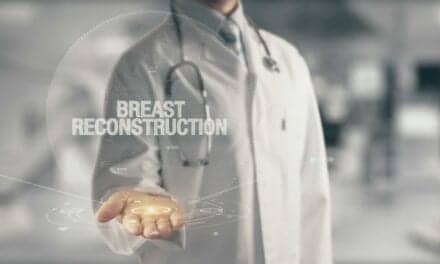By Kenna Marriott
Shortly after my daughter Jeannine’s 40th birthday, she went for her first mammogram. She was shocked to learn that it showed a large mass in her left breast. Test results were sent to her family doctor. His recommendations: find an oncologist, confirm the findings with a biopsy, and if positive, follow through with a mastectomy and breast reconstruction, if she desired.
Jeannine felt as if she were in a bad dream. She wondered: “How did I go from getting my first mammogram to a discussion about breast cancer, a mastectomy, and reconstruction of my breast within a few days?”
When she got home, she researched breast cancer, names of oncologists in the Pittsburgh area, and local hospitals recognized for work with cancer as well as reconstructive surgery.
The next day she told me. We both sobbed so hard I thought the bed we were on would collapse. It was only one of many heartfelt and tearful discussions we would have over the next 7½ years. She asked me to go with her to meet and interview the two oncologists and two plastic surgeons.
The following weeks were a whirlwind. More research and so much information about the mastectomy, reconstruction, chemotherapy and radiation, and drug trials that we could hardly keep it all straight.
It was overwhelming trying to keep pace with the information that most doctors took years to study and understand. Some doctors spoke way too fast, using many technical terms. I think they forget cancer patients are hearing this all for the first time, and are so scared that most of what’s said goes over their heads.
My daughter ultimately picked an oncologist with excellent credentials, who explained the process in detail; answered all of our questions; seemed warm, caring, and genuine; and made her feel comfortable. This oncologist also recommended two plastic surgeons. An important choice for a similar reason: “This plastic surgeon will be the one to rebuild my body and make me feel whole again,” Jeannine said hopefully.
Jeannine choose the plastic surgeon who took the time to assure that she understood everything about the surgical options for breast reconstruction, from implants to using her own body fat and muscle from her stomach, creation of a nipple, and the tattooing of the areola. She needed reassurance, and was afraid that she wouldn’t look the same after the procedures. He eased her fears and made her feel like he saw her as a person … not just another cancer reconstruction case.
THE DAY FINALLY COMES
She waited a month before her mastectomy could be scheduled. I don’t know how she did it—knowing there was cancer inside her body. Then finally, the day of surgery. She had opted for a single left breast removal and the reconstruction thereafter. As she kissed me goodbye before going into the operating room, I noticed a dignity and courage I’d never seen before. I was in awe. She grabbed my hand and mumbled, “I love you. I’ll be all right.” Without a doubt, that was the longest day of my life.
Recovery was hard, and I was glad I’d planned to stay as long as I was needed. Nine days after surgery, the drain was removed and Jeannine began physical therapy to rebuild her muscles and regain normal movement in her arm. If the doctor wanted five circles, she did 10. If they wanted 12 squeezes on the rubber ball, she did 20.
The next major challenge began about 8 weeks after her surgery: chemo and radiation. Although each person tolerates the treatments differently, the side effects are well-known: nausea, vomiting, fatigue, hair loss. Jeannine also got earth-moving migraines and sores on her body.
When she visited her oncologist or plastic surgeon, I expected them to be more aware of what she was going through and give her personal encouragement. Telling her everything was coming along fine just didn’t seem like enough.
Physicians, in general, should take just a few extra minutes to show more empathy to patients dealing with any type of cancer. Giving them back some of their dignity and confidence would go a long way to help their healing. Doctors should also remember that even though they deal with cancer diagnoses and informing patients of their options all the time, patients (probably) only hear this one time in their lives. It’s not an everyday event for the patient.
During the following months, Jeannine was still very self-conscious. I noticed
the erosion of her self-esteem as the disease and surgeries took a toll on her body. The left breast had been removed, and the majority of the reconstructive surgery was completed, using muscle and fat
from the stomach area. All that was left to do was the creation of a new nipple and areola.
Her plastic surgeon met with her, examined the new breast, and smiled. “Well, Jeannine, the breast looks fantastic. They’re both the same size, the majority of the scars are healed. You did well with your therapy, chemo, and radiation. You’re ready for the finale.”
CANCER STRIKES AGAIN
By year’s end, things were looking up. Jeannine was cautiously in remission. It only lasted 13 months, however; our world collapsed again. She had bad back pains but attributed them to “going up
and down the stairs with heavy loads of laundry.” She mentioned it to her oncologist during a follow-up visit. After blood work, scans, and tests, they discovered the breast cancer had metastasized in her backbone.
For the next 4 years, she lived with this insidious disease. In her last 6 months, the cancer moved into the soft tissue in her stomach and signaled the end. She passed away on June 24, 2008. My daughter was brave, strong, inspirational, and a symbol of hope to everyone she knew. She is my hero.
I am grateful that she found an oncologist and plastic surgeon who were extremely caring. They helped her along her path with empathy and encouragement. They made her feel like a person, not a patient. n
| Kenna Marriott is the author of Coulda, Shoulda, Woulda … A Mother’s Lessons, Learnings, and Insights from Her Daughter’s Battle with Cancer. She is a motivational speaker and patient advocate. She can be reached through her blog site, Livewithcancer.info, or via email at [email protected]. |






